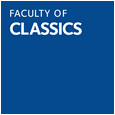Classics (Literae Humaniores)

Explore the languages, literature and history of the Ancient Mediterranean, as well as the archaeological and philosophical remains of the Classical world. Classics offers a great opportunity to study a vast range of subject areas focusing on the Graeco-Roman world and its reception into modern times. There are opportunities for studying a variety of different materials including written texts, buildings, wall paintings and pots, from Britain to Egypt, Iran to Germany, 2000 BC to AD 2000. Whether you’re interested in what Homeric warriors wore, how Ciceronian oratory influences modern politics, or the survival of an ancient text, there is something for everyone in a Classics degree.
Our Classics degree programme is open to all students, whether or not they have any prior experience of Latin or Ancient Greek. In previous years Oxford offered two separate Classics degree programmes: Classics Course I (Q800) - for those who had studied Latin and/or Greek to A-level or equivalent, and Classics Course II (Q810) – for those who had not. Following a redesign of the degree structure, there is now just one degree programme (Classics – Q800) which is for all candidates, whether or not they have any prior experience of Latin or Greek: students follow different language streams depending on their previous experience. If you have studied Latin or Ancient Greek (or both) at A-level or equivalent, you will follow the dual-language stream (with classes at the appropriate level in both Latin and Greek). If you have not studied either Latin or Greek at A-level or equivalent, you will follow a single-language stream, and can choose to study either Latin or Greek. Although students follow different language streams, the same literature, philosophy, and history/archaeology/philology options are open to all.
UCAS CODE: Q800
Course Length: 4 years
Course requirements: There are no specific subject requirements, though Latin, Ancient Greek, Classical Civilisation, Ancient History or a modern language can be helpful to students in completing this course.
University Prospectus: http://www.ox.ac.uk/admissions/undergraduate/courses-listing/classics
Structure of the Course:
The course is divided into two parts, ‘Mods’ and ‘Greats’. The Mods course involves the study of language, literature, philosophy, and a choice between history, archaeology and philology. Mods covers the first five terms of the course – at the end of which students sit a series of examinations. The Greats course, which covers the next seven terms, offers students a very flexible pathway through an extraordinary range of subjects. In the final term of the course, students sit another series of examinations, which will form the basis of their degree classification.
|
|
|
Dual-language stream |
Single-language stream |
|---|---|---|---|
|
First 5 terms |
'Mods' (Honour Moderations in Classics)Language work literature Philosophy (ancient or modern) History, Archaeology or Philology |
9 papers, including four language papers (two in Latin, two in Greek) |
6 papers, including two language papers (in the chosen language) |
|
Next 7 terms |
'Greats' (Honour School of Literae Humaniores)A choice of 8 from around 80 papers including:
|
8 papers
|
8 papers
Optional: Learning a second classical language |
University Prospectus: http://www.ox.ac.uk/admissions/undergraduate/courses-listing/classics



